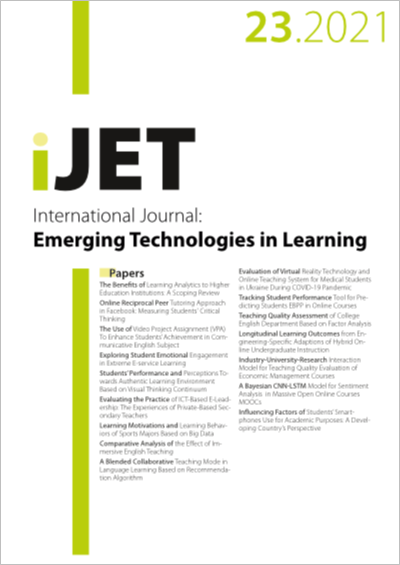Voice Analytics for the Identification of University Student Satisfaction, from WhatsApp Audio Messaging
DOI:
https://doi.org/10.3991/ijet.v18i21.39073Keywords:
student satisfaction, teacher performance, voice analytics, voice messages, WhatsAppAbstract
In the context of virtual teaching during the COVID-19 pandemic, a gap emerged between students and teachers due to social distancing measures. This gap hindered the flow of information about the teaching-learning process, making it difficult for authorities to make informed decisions to improve student satisfaction and teaching performance. In this context, the widespread use of mobile applications, through which students express their opinions on the conditions of their learning sessions, is significant. In this sense, the objective of this paper is to apply voice analytics to identify the factors that contribute to the lowest level of student satisfaction in teacher performance using WhatsApp audio messaging. The study has a quantitative approach, an exploratory-descriptive level, and a non-experimental cross-sectional design. The study population consisted of 33 students. It was determined that the factor with the lowest level of satisfaction is the dimension “class session administration,” with a percentage of 57.58%, which is significantly lower than the satisfaction levels of the other factors analyzed, which are above 90%. Therefore, it is concluded that in addition to using rubrics to evaluate teacher performance in adhering to lesson plans and class sessions, the authorities should also implement regulations that support the use of voice analytics through mobile applications like WhatsApp. This will provide insights from students, who are direct participants in the teaching process, regarding their perception of teaching performance.
Downloads
Published
How to Cite
Issue
Section
License
Copyright (c) 2023 Omar Chamorro-Atalaya, Max Quispe-Aguilar, Wilson Candia-Quispe , Avid Roman-Gonzalez, Yreneo Cruz-Telada, Raul Suarez-Bazalar , José Antonio Arévalo-Tuesta

This work is licensed under a Creative Commons Attribution 4.0 International License.



